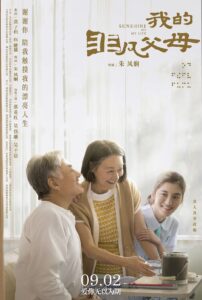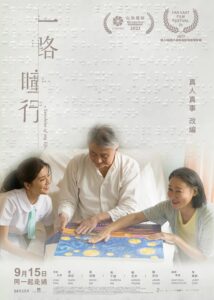Sunshine of My Life
一路瞳行
Hong Kong/China, 2022, colour, 16:9, 90 mins.
Director: Zhu Fengxian 朱凤娴 [Judy Chu].
Rating: 4/10.
Modest drama about a teen and her blind parents is a deeply-felt feature debut by Hong Kong’s Zhu Fengxian [Judy Chu] but weakly scripted and over-melodramatic.
Hong Kong, a public housing estate, 1980. A blind couple, Zhu Guoqiang (Wu Dairong) and Gan Xiaohong (Hui Yinghong), are delighted when the latter gives birth to a daughter, Zhu Zhixin, whose eyesight is okay. However, one day baby Zhu Zhixin, unseen by her mother, is scalded when she pulls a rice cooker off a shelf. She has to be taken to hospital, and friends tell the parents to take the baby to a social welfare bureau to be raised. However, they refuse, and as Zhu Zhixin grows into a young girl she helps her parents to see and read things. During the daytime she also accompanies her father when he hawks goods on the pavement. By the time she’s a teenager (Wu Qianyu) at secondary school, she’s become interested in art and, encouraged by teacher Chen (Chen Bei’er), has applied for a scholarship to study in London. She’s desperate to get out of Hong Kong as she’s starting to chafe under the demands of her parents, especially her demanding mother. On the outside, she remains dutiful; but on the inside she yearns to  spend more time with her schoolfriends, especially Zhijian (Yang Tianyu), a boy from a well-off family. However, anxious to be accepted, she still keeps her parents’ blindness secret from her schoolfriends. Her father now has a steady job as a masseur, and he offers to try to settle a dispute between his fellow employees and the boss. On the day of her interview for the London art academy, Zhu Zhixin is suddenly called by her mother over an eye scare that turns out to be nothing; as a result she misses the interview and later has a big argument with her mother, saying that, thanks to her, she has no friends, no social life and no future. At Zhijian’s birthday party Zhu Zhixin confesses she wants “freedom” from her family. Her father is more understanding but it’s her conservative, over-protective mother who rules the roost. Finally things come to a head one evening and Zhu Zhixin walks out.
spend more time with her schoolfriends, especially Zhijian (Yang Tianyu), a boy from a well-off family. However, anxious to be accepted, she still keeps her parents’ blindness secret from her schoolfriends. Her father now has a steady job as a masseur, and he offers to try to settle a dispute between his fellow employees and the boss. On the day of her interview for the London art academy, Zhu Zhixin is suddenly called by her mother over an eye scare that turns out to be nothing; as a result she misses the interview and later has a big argument with her mother, saying that, thanks to her, she has no friends, no social life and no future. At Zhijian’s birthday party Zhu Zhixin confesses she wants “freedom” from her family. Her father is more understanding but it’s her conservative, over-protective mother who rules the roost. Finally things come to a head one evening and Zhu Zhixin walks out.
REVIEW
It would be nice to report that Sunshine of My Life 一路瞳行, a modestly budgeted Hong Kong drama about a teenage girl growing up with two blind parents, is a powerful first feature by writer-director Zhu Fengxian 朱凤娴 [Judy Chu] and a personal triumph for its two veteran stars, Hui Yinghong 惠英红 [Kara Hui] and Wu Dairong 吴岱融 [Hugo Ng]. Based on Zhu’s own life, and expanded from a 17-minute short, Undernourished? 发育。不良?! (2015), with different actors that she earlier wrote and directed, it’s clearly a deeply-felt movie by the theatre actress-turned-film-maker. But despite good-looking, well-composed visuals and a heartfelt theme, Sunshine is a rather obvious and thinly written melodrama whose building blocks are very stereotypical and whose focus is more on the daughter than the parents, providing the most opportunities not for Hui or Wu but for Chinese-French actress Wu Qianyu 吴千语 (the bubbly techie in Bounty Hunters 赏金猎人, 2016) as the freedom-yearning teen. Released first in the Mainland, the co-production made no impression with a tiny RMB6.2 million, average for a specialised or arty production; in Hong Kong, a couple of weeks later, it made even less with a nothing HK$4.6 million.
Though the film starts off with the daughter as a baby, and the family of three forming a tightly-knit group, after 15 minutes it flashes forward to around the mid-1990s with the daughter now a teenager at secondary school and more interested in her art studies, and hanging out with friends her own age, especially one boy. It soon becomes a drama centred on the girl’s desire for “freedom” – from Hong Kong, her demanding, conservative mother and the whole thing of having two blind parents that she keeps secret from outsiders. The girl’s internal struggles aren’t dramatically shaped in an especially interesting way – mostly huffy behaviour that finally erupts into a massive row with the mother – and the final section, in which she has to choose between “freedom” or “family”, is both more and more melodramatic and predictable, with dialogue that’s either obvious or purely descriptive.
Essentially a production by Hong Kong’s Pegasus Motion Pictures, owned by veteran producer-director Huang Baiming 黄百鸣 [Raymond Wong], it’s co-creatively produced 监制 by Huang’s son, Huang Zihuan 黄子桓 [Edmond Wong], himself a variable writer (Saving General Yang 忠烈杨家将, 2013; the Ip Man 叶问 series, 2008-19). Actress Wu, who’s been a Pegasus regular since her debut in lame college fantasy Magic to Win 开心魔法 (2011), gets her most challenging role to date and performs okay overall, convincingly playing a teenager despite being in her late 20s; but she’s too often let down by Zhu’s so-so screenplay. With a disfigured left eye, and a role that becomes more and more one-note naggy, Hui, 62, doesn’t help matters by repeatedly blinking as if the contact lens is an irritant. Singapore-born actor-director Wu, 63, is much more likeable as the father, but his role is seriously underwritten. As the daughter’s sympathetic art teacher, Hong Kong TV presenter Chen Bei’er 陈贝儿, 43, is notably poised and understated in her film debut.
Widescreen photography by newbie d.p. Tan Jiahao 谭家豪 (The Way We Keep Dancing 狂舞派3, 2020) is notable for both its neat compositions and evocation of natural lighting, and the simple keyboard/fretted score by Zhang Zhaohong 张兆鸿 (courtroom drama Guilt by Design 催眠•裁决, 2019) is nicely underplayed. Heavy on interiors, the film has no special feel for Hong Kong or its everyday life and was, in fact, largely shot across the border in the Mainland.
The Hong Kong Chinese title is an untranslatable pun on the expression “travelling the road [of life] together” 一路同行, with the third character (同 tóng) replaced with the homonym 瞳, meaning the pupil of the eye. In the Mainland the Chinese title was 我的非凡父母 (literally, “My Extraordinary Parents”). The film is dedicated by Zhu to “my blind parents”, with a note that her father passed away on 24 Feb 2018.
CREDITS
Presented by Pegasus Visual Media Culture (Beijing) (CN), Mandarin Motion Pictures (HK), Local Production (HK), Film Development Fund (HK), Shanghai Mingzhao Motion Pictures Culture (CN), Shanghai Pegasus United Motion Pictures Culture (CN), Foshan Dongtian Motion Pictures Culture (CN). Produced by Local Production (HK), Just Production (HK).
Script: Zhu Fengxian [Judy Chu]. Photography: Tan Jiahao. Editing: Zheng Weilin. Music: Zhang Zhaohong. End-title song: Wu Qiming (music), Huang Baiming [Raymond Wong] (lyrics), Xiao Kai’en (vocal). Art direction: Huo Peishi. Costumes: Huo Peishi. Sound: Zhuang Tengzhi, Li Zhixiong. Visual effects: Li Haohui.
Cast: Hui Yinghong [Kara Hui] (Gan Xiaohong), Wu Dairong [Hugo Ng] (Zhu Guoqiang), Wu Qianyu (Zhu Zhixin/Summer), Yang Tianyu (Zhijian/Ryan), Chen Bei’er (Chen, art teacher).
Premiere: Far East Film Festival, Udine, Italy, 26 Apr 2022.
Release: Hong Kong, 15 Sep 2022.
